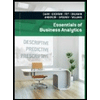
Executive compensation, balanced scorecard. Acme Company recently introduced a new bonus plan for its corporate executives. The company believes that current profitability and customer satisfaction levels are equally important to the company’s long-term success. As a result, the new plan awards a bonus equal to 0.5% of salary for each 1% increase in business unit net income or 1% increase in the business unit’s customer satisfaction index. For example, increasing net income from $1 million to $1.1 million (or 10% from its initial value) leads to a bonus of 5% of salary, while increasing the business unit’s customer satisfaction index from 50 to 60 (or 20% from its initial value) leads to a bonus of 10% of salary. There is no bonus penalty when net income or customer satisfaction declines. In 2016 and 2017, Acme’s three business units reported the following performance results:

- 1. Compute the bonus as a percent of salary earned by each business unit executive in 2017.
Required
- 2. What factors might explain the differences between improvement rates for net income and those for customer satisfaction in the three units? Are increases in customer satisfaction likely to result in increased net income right away?
- 3. Acme’s board of directors is concerned that the 2017 bonus awards may not accurately reflect the executives’ overall performance. In particular, the board is concerned that executives can earn large bonuses by doing well on one performance dimension but underperforming on the other. What changes can it make to the bonus plan to prevent this from happening in the future? Explain briefly.
Want to see the full answer?
Check out a sample textbook solution
Chapter 23 Solutions
HORNGRENS COST ACCOUNTING W/ACCESS
- Richard has the following potential liabilities: William, a former employee, has sued Richard for $880,000. Richard contacted his attorney, and the case is believed to be frivolous. Carter sued Richard for an undisclosed amount for a class action lawsuit. Richard thinks it's frivolous, but his attorneys indicate a loss is probable for $88,000. Charles sued Richard because he slipped outside of Richard's store. The claim is $264,000 and Richard is certain he will lose the case but believes Charles will settle. The attorneys agree and based on conversations with Charles's attorneys, have stated that it is remote the claim will be settled for $255,200. Charles's attorneys indicated he would be willing to accept either cash of $242,000 or shares of Richard's closely-held common stock currently valued at $233,200. Richard would prefer not to settle in cash. Richard is suing William for $264,000 because William is in violation of a non-compete agreement he has with Richard. Richard is…arrow_forwardNeed answer the financial accounting question not use aiarrow_forwardHow much were SMS's liabilities on these general accounting question?arrow_forward
 Essentials Of Business AnalyticsStatisticsISBN:9781285187273Author:Camm, Jeff.Publisher:Cengage Learning,
Essentials Of Business AnalyticsStatisticsISBN:9781285187273Author:Camm, Jeff.Publisher:Cengage Learning, Cornerstones of Cost Management (Cornerstones Ser...AccountingISBN:9781305970663Author:Don R. Hansen, Maryanne M. MowenPublisher:Cengage Learning
Cornerstones of Cost Management (Cornerstones Ser...AccountingISBN:9781305970663Author:Don R. Hansen, Maryanne M. MowenPublisher:Cengage Learning


